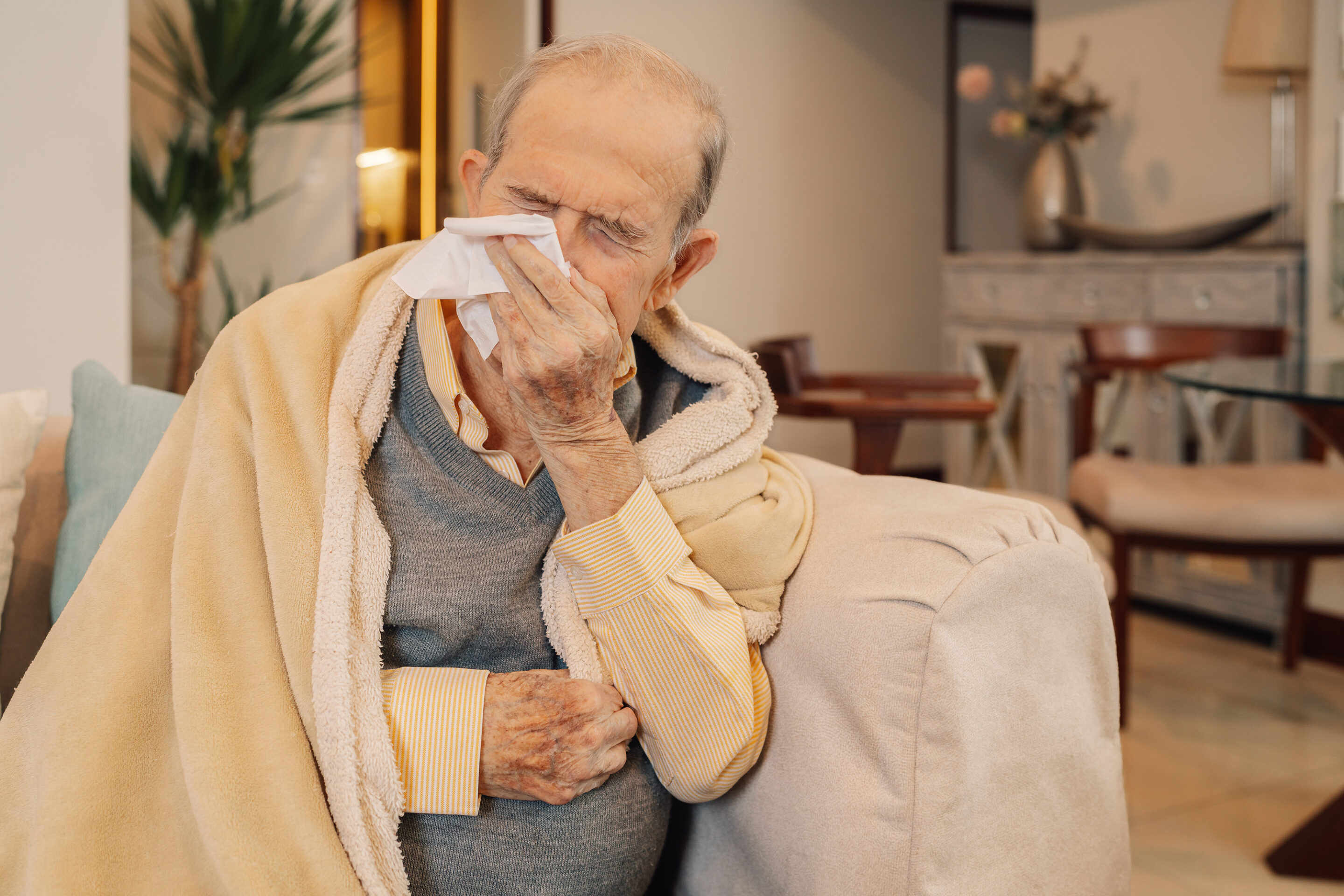It’s that time of year again when the days start to get shorter, leaves fall gently from the trees, and viruses begin to circulate more freely, causing an uptick in cold and flu cases.
Many people shrug off cold and flu season, as well as COVID and other seasonal respiratory diseases. However, to older adults and other vulnerable people, it can be a serious matter. Older people, in particular, often have weakened immune systems, which may increase their susceptibility to viruses, worsen their symptoms, and hamper recovery.
As a family member or caregiver to an older loved one, you can play a crucial role in helping protect the health of those around you with practical strategies that reduce the risk.
Why certain populations are at risk
As we age, our immune system begins to decline. This means our bodies produce fewer immune cells, and those we do don’t work as efficiently to fight off infections, leading to a higher risk of contracting a cold or the flu. There is also a higher probability of severe complications arising from an illness, such as pneumonia or bronchitis.
Many older people live with one or more chronic health conditions, such as asthma, diabetes, heart disease, or kidney disease, making them more vulnerable to viruses.
Furthermore, older adults often take significantly longer than the average person to recover from a cold or flu, resulting in prolonged weakness and increased time spent in bed or being generally sedentary. This situation can lead to a loss of independence, reduced physical activity, and social isolation, which can negatively impact their mental and emotional well-being.
Children are also at a high risk for serious flu-related complications, including hospitalization. The immune systems of young children, particularly those under five, are still developing the ability to fight off infections. They’re also often in close contact with others in settings such as daycare, preschool, and school, which makes it easy for germs to spread, especially if the children don’t understand or practice proper hand hygiene.
Recognizing the Warning Signs
Although the flu can strike at any time of year, family members need to pay special attention to the warning signs of illness between November and February, and sometimes as early as October.
These warning signs include a sudden onset of fever, chills, cough, fatigue, sore throat, and muscle aches. Many people with a cold or the flu also report headaches, dehydration, and a loss of appetite.
It’s essential to seek medical advice if symptoms worsen after a few days, flu-like symptoms improve but then return with a fever or cough, or if chronic conditions worsen.
Seek emergency care or visit an ER if your loved one experiences any of the following severe symptoms:
- Difficulty breathing or shortness of breath
- Pain or pressure in the chest or stomach
- Sudden dizziness or lightheadedness
- Confusion or disorientation
- Severe or repeated vomiting
Common Myths About Flu
MYTH: Healthy seniors don’t need the flu shot.
FACT: The flu can cause serious complications and hospitalization in older adults, and severe cases can trigger chronic conditions or even lead to death. Health Canada recommends that everyone over the age of six months, particularly those in high-risk groups such as individuals over 65, receive the flu shot annually. High-dose vaccines are available that may offer better protection for older adults.
MYTH: The flu shot can give you the flu.
FACT: According to the World Health Organization, the flu vaccine contains an inactivated virus that cannot give the recipient the flu. Side effects such as aches or mild fevers are common and typically only last no longer than two days.
MYTH: Colds and flu are the same thing.
FACT: A cold and flu are both respiratory illnesses, but caused by different viruses, with colds generally being milder and flu symptoms being more severe and abrupt. For example, symptoms like a runny or stuffy nose are more common with a cold, whereas the flu is more likely to be accompanied by fever, chills, aches, and other severe symptoms. Furthermore, colds rarely lead to serious complications. The same cannot be said about the flu.
MYTH: The COVID vaccine doesn’t work.
FACT: The COVID-19 vaccine remains effective at preventing severe illness, hospitalization, and death from the virus. It can also help reduce the risk of developing long COVID. Vaccine effectiveness against infection can decrease over time, which is why updated vaccines are recommended for each season.
Key Prevention Strategies
You can protect the health of your older loved one, your family, and yourself by following the below cold and flu prevention strategies:
- Get your annual flu shot and encourage others in your family to get theirs
- For even more protection, you can get the new combined flu and COVID vaccine at participating pharmacies
- Wash your hands often, using plenty of soap and warm water
- Cover your mouth when you cough, and sneeze into a tissue or the inside of your sleeve or elbow, not your hands
- Keep your hands away from your eyes, nose and mouth to keep germs from entering your body
- Follow a nutritious meal plan and stay hydrated
- Disinfect common surfaces in your home, such as doorknobs, light switches, and computer keyboards, as well as your cellphone
- If you do become sick, stay at home
Community and Government Resources
Stay in touch with the latest health alerts by visiting the Ontario Health and Toronto public health websites.
Learn more about where to get the flu shot in Toronto to ensure you get the recommended protection this and every cold and flu season. Also, you can learn how to stop the spread of flu, COVID, and other respiratory diseases on the City of Toronto website.
Caregiver Self-Care During Flu Season
As loving caregivers, we want to take care of our parents and grandparents, especially when they’re sick. However, it’s also essential to prioritize your health so you can continue to provide care for your older loved one.
In addition to the tips listed above to protect yourself against a cold or the flu, it is also essential to manage stress levels and avoid burnout. Be sure to get plenty of sleep, eat a healthy diet, share care duties with another family member or trusted friend, and stay connected with your other loved ones and social contacts.
And remember, you don’t have to be in this alone. When you need help caring for an older loved one on a respite, part-time, or full-time basis, CareHop is only a phone call away.
Quality In-Home Elder Care Services in Toronto, Etobicoke, Mississauga, and Brampton
CareHop specializes in providing safe, professional eldercare services, including on-demand Alzheimer’s disease and dementia care, personal care, and assistance with physical activities whenever you need it.
Contact us today for a free, no-obligation discussion to discover how we can help you with safe, cost-effective eldercare solutions.




